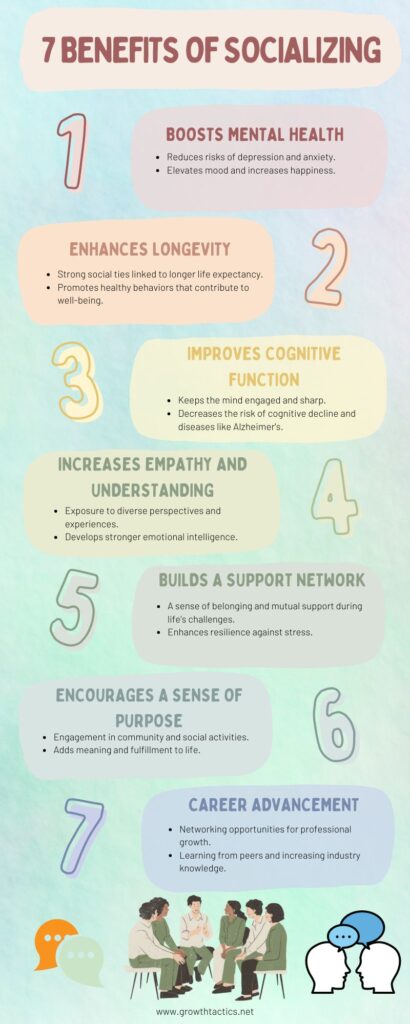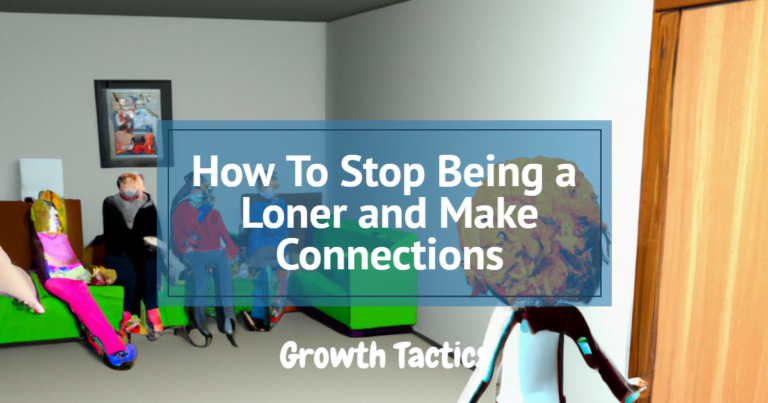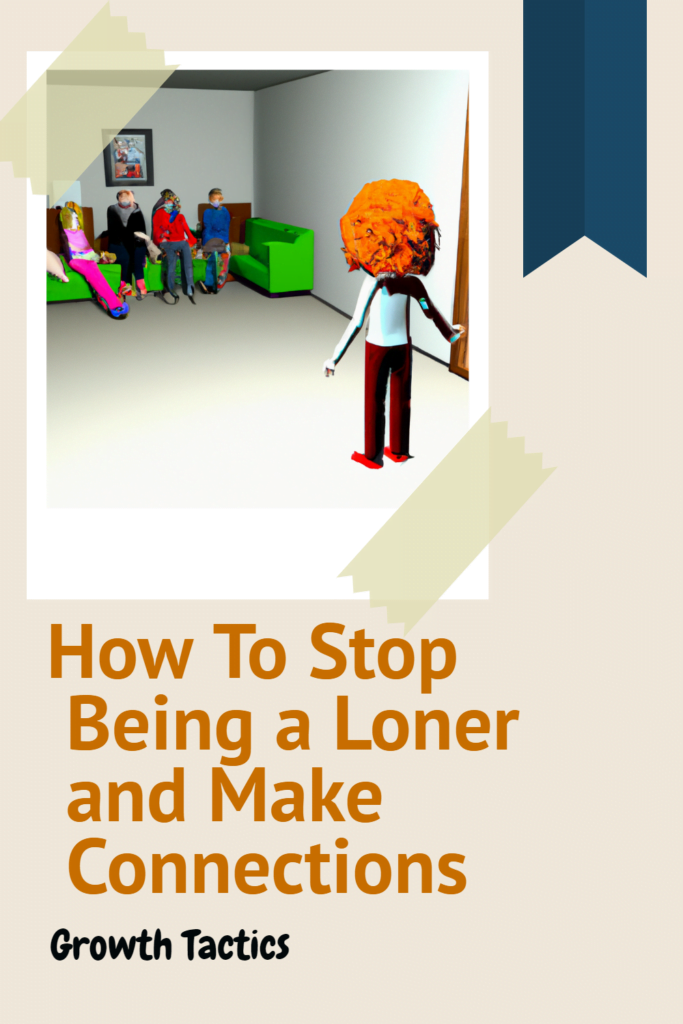Are you tired of feeling lonely? I get it. Sometimes, I’ve felt that pang of solitude too. Now, think about this: you have two choices. You can either settle into that loneliness or take a stand and shake things up. What’s it going to be?
Jump To Section
Understanding Loneliness
Loneliness is tricky. It’s not just about being alone. Sometimes, you feel it in a crowded room. It’s that ache for connection. And it doesn’t just hit introverts. Extroverts know this feeling too.
But what is loneliness, really? It’s a signal, much like hunger or thirst. Your body is telling you it needs social contact. Ignoring it isn’t the best idea. Prolonged loneliness can wear on you, mentally and physically.
Pay attention to how you feel. Do you avoid social events? Prefer to stay in, day after day? Do you feel anxious at the thought of meeting new people? These could be signs. They suggest you might be leaning into recluse territory, not just enjoying your own company.
Know this: You’re not stuck. Recognizing the problem is step one. You’ve just taken that step. Let’s move forward together.
Acknowledging the Benefits of Socializing

Socializing isn’t just fun. It’s essential. When you connect with others, good things happen. You feel happier, stress levels drop, and believe it or not, you might even live longer. That’s right, chatting over coffee or laughing with friends can boost your health.
Think of it this way: humans are social creatures. Our brains light up when we share experiences. Ever felt a rush after a good conversation? That’s your brain rewarding you. It’s saying, “Let’s do that again.”
Friendships give us support. They’re our safety nets. Had a bad day? A friend can lift your spirits. Overwhelmed? Sharing your troubles can lighten the load. Plus, socializing teaches us about empathy and understanding different perspectives.
But there’s more. Being social keeps your mind sharp. Every interaction is a mini workout for your brain. And let’s not forget confidence. The more you socialize, the more confident you become in new situations.
So, take a moment to think about your social life. It’s more than just hanging out. It’s about nurturing your well-being, one connection at a time. Ready to step up your social game? Let’s dive deeper.
Overcoming Barriers to Social Connection
Many of us hit roadblocks when it comes to making friends. But here’s the good news: you can overcome these barriers.
First, tackle shyness head-on. Start with small steps. Smile at co-workers. Make quick eye contact. These tiny moves build confidence.
Social skills can be learned, just like anything else. Practice makes perfect. It just takes time and effort. Try chatting with a neighbor or a colleague. Ask questions. Show interest in their answers. It might feel awkward at first, but it gets easier.
Maybe you’re thinking, “I lack the energy.” That’s okay. Listen to your body. But remember, isolating yourself too much can drain your energy more than it saves. Try to balance your alone time with social activities.
Worried about rejection? It happens to everyone. Not every interaction will be perfect. Don’t take it too personally. Each conversation is a learning opportunity.
Remember, breaking out of your comfort zone is key. Yes, it’s uncomfortable. But it’s also where growth happens. It’s okay to start small. Are you ready to push your boundaries? Let’s make social connections happen!
Reasons Behind Becoming a Loner
People become loners for various reasons. Each person’s journey is unique, yet common themes often emerge.
Desire for Solitude
Some people find peace in solitude. They recharge their energy by being alone. For them, quiet moments are precious.
Past Traumas
Traumatic experiences can push individuals to isolate themselves. They might find safety in solitude, away from potential hurt.
Social Anxiety
Fear of judgment or rejection causes some to avoid social situations. They feel more comfortable alone.
Introversion
Introverts naturally prefer small gatherings or alone time. They find large social events draining.
Personal Interests
Unique hobbies or interests not shared by peers can lead to spending more time alone. It’s a matter of choice rather than compulsion.
Dislike of Small Talk
A preference for deep conversations over small talk can limit social interactions. Loners often seek meaningful connections.
Independence
Some value independence highly. They enjoy making decisions without external influence, leading to more time spent alone.
Understanding the reasons behind becoming a loner helps in recognizing the value of diverse social needs. Whether by choice or circumstance, being a loner is a valid way of experiencing the world.
Practical Steps to Stop Being a Loner
Whether you’re naturally introverted or have simply found yourself in a cycle of solitude, taking practical steps to engage with those around you and making new friends can significantly improve your sense of belonging and happiness. Below, we present some straightforward, actionable strategies designed to help you break out of the loner mindset and navigate the path to building meaningful relationships.
Identify Your Interests
Kick-off by pinpointing what excites you. Jot down your hobbies and passions. Are books your thing? Sign up for a book club. Got a knack for painting? Enroll in an art workshop.
Finding others who get just as excited about your interests makes conversations flow naturally. Talking about what you love feels effortless and genuine.
Set Social Goals
Craft achievable social goals for yourself. Begin with something straightforward. Challenge yourself to strike up a conversation with someone new this week.
Next, consider joining a group activity or event the following month. Ensure your goals are within reach and keep tabs on your advancements. This methodical approach keeps you motivated and on track.
Make an Effort
Venturing out of your comfort zone is essential for building new relationships. It’s normal for initiating chats to seem intimidating initially but remember, your boldness often leaves a positive impression.
By actively putting yourself in social scenarios and remaining open to creating new bonds, you lay the groundwork for a lifestyle enriched with supportive and engaging companionships.
Engage in Community Activities
Scan your local scene for happenings. Get involved. Volunteer for causes you believe in, or attend community events with like-minded people. Participate in community gardens or help out with local clean-up efforts.
Such engagements connect you with others who share your values and interests. Besides the added bonus of contributing to your community, these activities are incredible for kindling friendships.
Use Technology Wisely
Harness the power of technology to broaden your social horizons and interact with others. Platforms such as social media and various networking apps present opportunities to connect with individuals who share your interests.
Nevertheless, it’s essential to find a healthy equilibrium. Avoid falling into the trap of endless online conversations which can lead to superficial connections.
Strive to use these digital tools as a means to facilitate real-world interactions. Plan face-to-face meetings or attend events you learn about online to foster more meaningful relationships.
Embrace Being a ‘Yes’ Person
Cultivate a habit of saying yes to social engagements, even if it means stepping out of your comfort zone for just a brief period. Your presence at these gatherings, no matter how short, contributes to building your social momentum.
Over time, with each event you attend, you’ll notice an increase in your ease and comfort within varied social situations. Continuous exposure and practice are key to overcoming hesitations and developing a more relaxed and confident social demeanor.
Appreciate Solitude
Shift your perspective to see solitude as a gift, not a curse. Being alone offers a unique chance to delve into your thoughts and interests without distraction, fostering a deeper understanding and appreciation of yourself.
This relationship with yourself is foundational. When you value and enjoy your company, you naturally attract others. Initiating self-dates, like visiting a museum or enjoying a meal alone, can significantly strengthen your self-esteem and independence, making you more appealing in social contexts.
Professional Guidance
There’s absolutely no shame in seeking help if you find social interactions overwhelmingly anxiety-inducing. A professional therapist or counselor can provide you with tailored strategies to manage your fears more effectively.
Additionally, they can assist in the cultivation of essential social skills in a supportive and non-judgmental environment. This step might be crucial for those who feel their social anxiety is a barrier to leading a fulfilling social life.
Cultivate Self-Compassion
Adopting a stance of self-compassion is crucial as you navigate the path of personal development. Change is inherently slow and sometimes challenging. It’s important to acknowledge and celebrate every small step forward you take.
Understanding and forgiving yourself when things don’t go as hoped are vital practices that foster inner strength and resilience. This kind-spirited approach towards yourself also makes you more empathetic and understanding in your interactions with others, enriching your social connections.
Each step takes you closer to a more connected life. Keep moving forward. Socializing is a skill that you can develop at your own pace. Remember, the goal is to enrich your life, not overwhelm it. You’ve got this!
Cultivating Relationships
Strong, healthy connections with others enrich our lives, providing support, joy, and a sense of belonging. Whether it’s deepening ties with old friends, fostering new ones, or even strengthening bonds within our families, every relationship requires nurturing. Here are some practical tips to help you cultivate and maintain these vital connections, ensuring they grow and flourish over time.
Start with Listening
Good relationships begin with listening. Pay attention when others speak. Show that you value their thoughts. This makes people feel respected and understood. Being a good listener draws others closer to you.
Share About Yourself
Sharing personal stories builds trust. Start with light topics. As your relationship grows, you can share more. This give-and-take forms the basis of a strong connection. Remember, vulnerability breeds closeness.
Be Reliable
Show up when you say you will. Keep your promises. Reliability builds trust. When friends know they can count on you, your bond deepens. Consistency is key in cultivating lasting relationships.
Express Appreciation
Tell friends what you appreciate about them. A simple “thank you” can mean a lot. Acknowledge their kindness, support, or insight. Everyone likes to feel valued. This gesture strengthens your connection.
Make Time
Busy schedules can erode relationships. Prioritize your social life. Schedule regular catch-ups. Even a quick message shows you care. Remember, quality trumps quantity. Make the time you spend together meaningful.
Handle Conflicts with Care
Disagreements happen. Approach conflicts with empathy and respect. Listen to the other person’s perspective. Seek solutions together. Handling disagreements well can actually bring you closer.
Nurture Different Relationships
Cultivate various types of relationships. Friends, family, mentors, and colleagues each bring something unique to your life. This diversity enriches your social world. Value each connection for what it uniquely offers.
Stay Positive
Be the friend you’d like to have. Bring positivity into your interactions. Support your friends through tough times. Celebrate their successes. Positivity is contagious and binds people together.
Building and maintaining relationships requires effort. But the rewards are immense. Close connections not only enrich your life but also contribute to your overall well-being. Start cultivating your relationships today.
Best Ways to Improve Your Social Skills
Improving your social skills is a rewarding journey that can lead to better personal and professional relationships. Here are some effective strategies to enhance your ability to connect with others:
1. Practice Active Listening
Active listening is crucial for meaningful interactions. Focus on truly understanding what the other person is saying, instead of just waiting for your turn to speak.
Show that you’re engaged by nodding, maintaining eye contact, and offering appropriate responses. This not only makes the speaker feel valued but also helps you grasp the nuances of the conversation.
2. Engage in Small Talk
Small talk serves as the building block for deeper conversations. Practice making small talk with strangers in safe environments, like while waiting in line or during a coffee break at work.
Discuss light topics such as the weather, your surroundings, or something relevant to the situation. These interactions can boost your confidence and make initiating conversations less daunting.
3. Observe Social Etiquette
Manners matter. Being polite, punctual, and showing respect can go a long way in fostering positive interactions. Pay attention to social norms such as shaking hands, saying “please” and “thank you,” and proper dining etiquette when applicable. Adhering to these basic guidelines shows consideration for others and promotes a positive social environment.
4. Ask Open-Ended Questions
To keep conversations flowing, use open-ended questions that require more than a yes or no answer. Questions like “What did you think about that event?” or “How do you usually spend your weekends?” encourage others to share more about themselves. This not only makes the conversation more engaging but also demonstrates your interest in getting to know them.
5. Develop Your Empathy
Empathy involves understanding and sharing the feelings of another. Try to put yourself in other people’s shoes, especially when they are sharing their feelings and experiences.
This can help improve the quality of your interactions and deepen your relationships. Empathy can be practiced by being attentive to body language, facial expressions, and tone of voice, which can give insight into the other person’s emotional state.
6. Attend Workshops or Take Classes
Consider enrolling in workshops or classes that focus on developing communication skills, such as public speaking or emotional intelligence training. These educational settings not only provide practical guidance but also offer a platform to practice what you’ve learned in a supportive environment.
7. Seek Feedback
Don’t hesitate to ask for feedback from people you trust. Understanding how others perceive your interaction style can provide valuable insights into areas for improvement. Constructive criticism can be a powerful tool for personal development.
By integrating these practices into your daily interactions, you’ll gradually see improvement in your social skills. Remember, like any other skill, social competence requires patience and consistent effort to develop.
Conclusion
Embark on your journey from solitude to social connection today. It might seem daunting, but remember, growth and opportunities await. If you’ve felt stuck in loneliness, know that you hold the power to change your situation.
The critical step? Reaching out and building new connections. Sure, you’ll encounter setbacks. But remember, it’s not about the times you feel disconnected; it’s about your willingness to reach out and try again.
So, why not take that first step now? Message an old friend, join a local group that sparks your interest, or share a smile with someone during your commute. Each gesture of openness marks a victory, a step towards a more connected life.
Remember, every connection begins with the courage to open up. Today is the perfect day to step out of the loner’s shadow and into the warmth of companionship. Your next great friendship is just a brave leap away.


